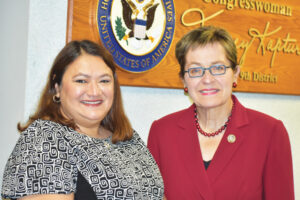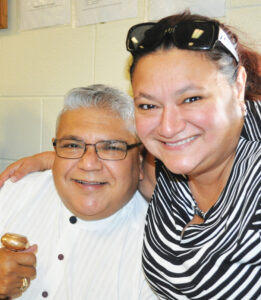
By La Prensa Staff
Some 2 decades Theresa Morris was a vital part of the administration, assisting Rep. Marcy Kaptur in District 9 [at times, included both Toledo and Cleveland]. Recently, Ms. Morris decided to serve the citizens of Toledo.
Theresa Morris has only been serving as a Toledo City Council member for a little over a year, but her past political and legislative experience has quickly elevated her to a leadership position among her city council colleagues.
During Toledo City Council’s annual organizational meeting last January, council members elected Morris to be council president pro tem, which is essentially city council vice president.
She presides over city council meetings in the absence of City Council President Matt Cherry and signs legislation into law when he’s unable to attend.
“It’s nice that my colleagues had the confidence in me to help to guide things up on the 21st floor (of One Government Center where city council has its offices),” she said. “That’s pretty neat, to feel you’re part of the history of Toledo.”
Morris becomes the first Latina to hold a leadership role on Toledo City Council. The first Latino was the late Louis Escobar, who served several years as city council president.
Morris also chairs the city council committee on regional growth, development, and small business enterprise. That committee holds oversight of the city departments of economic development, real estate, and building and code compliance.

Louis Escobar
“It’s a big job and so far we have passed the community entertainment districts, which expanded liquor permits in the downtown and east side areas,” she said. “We had the entertainment districts before, but then we grew. The growth of downtown has just been exponential and so, at some point, we needed to expand these. This is how you serve your community. You try to make it better.”
Ms. Morris was appointed to the District 6 city council seat in April 2021 to fill an unexpired term, but had to win a special election last September to retain her position. Her current term ends in 2023, so she’ll have to run for re-election next year. That process has already started with recent appearances alongside supporters at the Old West End Festival and a parade in Point Place.
“The district that I run in has changed, as have all of the districts,” she noted. An appointed city panel decided last month to realign each council district by population following the 2020 census, which caused a shift in the balance of people living within the old boundaries. “What was once a south end or an east side is now a little bit more of an inner city. It’s a lot.”
As she continues to familiarize herself with the sixth district comprised mostly of North Toledo, she now has a few more neighborhoods to get to know, along with its residents and their concerns. But she’s taking it all in stride and draws on 27 years of experience working as an aide to Congresswoman Marcy Kaptur. She hopes that will mean re-election next year to city council.
“I have a wonderful group of friends who are really good soldiers and believe that I’m a good candidate for this position,” she said. “Even though you’re not officially running (for office), you’re always running. You’re always trying to be mindful of the requests that come from your constituency, whether it’s snow removal or leaf pickup or it’s grass mowing.”
Morris noted that city council members try to shape a platform of change, but the reality is “sometimes issues find you.” That was the case recently with several complaints of afterhours clubs operating illegally in Toledo. She helped craft and pass legislation which gives the city law department more tools to shut down such clubs that operate without a state liquor permit and are being blamed for much of the city’s recent spate of gun violence.
While a city council member’s salary still reflects its traditional role as a part time job, Morris insists she will keep “putting in full time hours” to her job. Her retirement last year from federal government service affords her that opportunity. Morris stated she’s blessed and simply motivated by the chance to serve the community where she was born at a time when many of her council colleagues still must hold down full-time jobs to make ends meet at home.
Ms. Morris spent a few months as a facilitator for the minority executive leadership program at the Center for Nonprofit Resources, working alongside that agency’s Latina executive director Milva Wagner. Her goal is to help groom Latino and other leaders to step up in the community.
“We were working hand-in-hand, trying to find good leaders who can continue to do the work that has been done so far, especially in the minority communities,” she said. “Some of us are starting to get tired and now we need the new leaders who want to step up and start the long road to making things better and making sure people have a seat at the table.”

2012 Invitational Art Exhibition
That also has become part of her duties as a city council member: Latina leader. Ms. Morris stated she fields calls about the Mayores Senior Center, the Believe Center, and other Latino community institutions and issues.
“I have that flexibility and, honestly, the responsibility to try and help not just my district, but Latinos in the city—trying to make it better for them and be their voice at the table,” she said.
The Start High School graduate received a Distinguished Hispanic Ohioan award from the Ohio Commission on Hispanic/Latino Affairs in 2018 for her longevity as a Congressional aide—perhaps holding the distinction as the longest-serving Latina on Capitol Hill in that capacity. At least that is what the current research shows.
Locally, Ms. Morris has served on the boards of WGTE Public Media where she once worked and Team Recovery, after losing a loved one to a drug overdose. In the early 1990s, Ms. Morris was a an intern at La Prensa.
Ms. Morris earned her bachelor’s degree in 1993 from Alma College in Michigan, with a focus on Spanish Language and Latin American Literature. She later earned a Master’s degree in organizational leadership from Lourdes University in 2014.
Her family’s back story is a bit different than that of the typical Northwest Ohio immigrant who started as a migrant worker. Her grandfather came directly from México to work on the railroad during World War II, but sent money back home when his mother needed surgery. He had formerly worked in the silver mines of México after growing up in the small town of Taxco in the state of Guerrero.
Both of her parents broke new ground in Toledo. Her father became a Toledo firefighter at a time when there were few Latinos in the department. Her mother trained to become a union electrician in the 1970s when few women held the career. Both of her parents are now retired.

